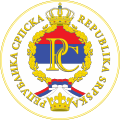Related Research Articles

Demographic features of the population of Bosnia and Herzegovina include population density, ethnicity, education level, health of the populace, economic status, religious affiliations and other aspects of the population.
The politics of Bosnia and Herzegovina are defined by a parliamentary, representative democratic framework, where the Chairman of the Council of Ministers of Bosnia and Herzegovina, named by the Presidency of Bosnia and Herzegovina, is the head of government. Executive power is exercised by the Council of Ministers of Bosnia and Herzegovina and the Presidency of Bosnia and Herzegovina. Legislative power is vested in both the Council of Ministers and the Parliamentary Assembly of Bosnia and Herzegovina. Members of the Parliamentary Assembly are chosen according to a proportional representation system. The judiciary is independent of the executive and the legislature.

Republika Srpska ; also known as the Republic of Srpska) is one of the two entities of Bosnia and Herzegovina, the other being the Federation of Bosnia and Herzegovina. It is located in the north and east of the country. Its largest city and administrative centre is Banja Luka, lying on the Vrbas river, and with a population of about 138,963 people.

The Federation of Bosnia and Herzegovina is one of the two entities composing Bosnia and Herzegovina, the other being Republika Srpska. The Federation of Bosnia and Herzegovina consists of ten autonomous cantons with their own governments and legislatures.
There is currently no official flag for the Federation of Bosnia and Herzegovina. The federation is part of the state of Bosnia and Herzegovina. The federation adopted its own flag in 1996, but the flag and associated coat of arms were deemed unconstitutional by the Constitutional Court of Bosnia and Herzegovina in 2007 and now it is considered to be a "de facto" flag. The federation has not yet adopted a new flag, anthem or coat of arms; instead the symbols of the central state are used for official purposes as a provisional solution.

The Republika Srpska was a self-proclaimed statelet in Southeastern Europe under the control of the Army of Republika Srpska during the Bosnian War. It claimed to be a sovereign state, though this claim was only partially recognized by the Bosnian government in the Geneva agreement, the United Nations, and Yugoslavia. For the first six months of its existence, it was known as the Serbian Republic of Bosnia and Herzegovina.

Milorad Dodik is a Bosnian Serb politician serving as the 8th president of Republika Srpska since 2022. Previously, he served as the 7th Serb member of the Presidency of Bosnia and Herzegovina from 2018 to 2022.

The Alliance of Independent Social Democrats is a Serb political party in Bosnia and Herzegovina. Founded in 1996, it is the governing party in Republika Srpska, with its leader, Milorad Dodik, serving as the current president of Republika Srpska. The party's vice-president, Željka Cvijanović, is the current member of the Presidency of Bosnia and Herzegovina, while SNSD member Radovan Višković is the current prime minister of Republika Srpska.
The Constitution of Republika Srpska is the chief legal act of Republika Srpska, an entity within Bosnia and Herzegovina. The constitution was delivered by the National Assembly of Republika Srpska on 28 February 1992, but had to be revised after the Dayton Agreement was signed. It provides the set of laws and principles for the territory, and among its finest functions, it defines the internal organization of the Republic, the function of the official institutions, and the rights and freedoms for its citizens.
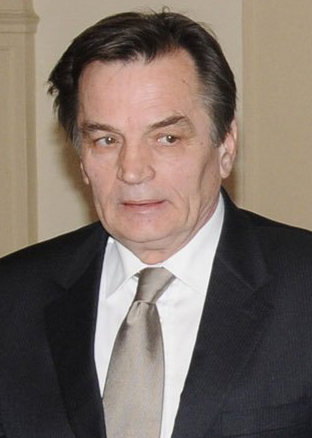
Haris Silajdžić is a Bosnian retired politician and academic who served as the 5th Bosniak member of the Presidency of Bosnia and Herzegovina from 2006 to 2010. He was the Prime Minister of the Republic of Bosnia and Herzegovina from 1993 to 1996.
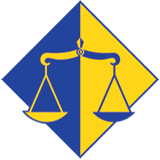
The High Judicial and Prosecutorial Council of Bosnia and Herzegovina is the national council of the judiciary of Bosnia and Herzegovina. It is the self-regulatory body of the judiciary in the country, tasked with guaranteeing its independence, with countrywide competences over the administration and career management of judicial office holders. It is based on the continental tradition of self-management of the judiciary.

General elections were held in Bosnia and Herzegovina on 1 October 2006. They decided the makeup of Bosnia and Herzegovina's Presidency as well as national, entity, and cantonal governments.
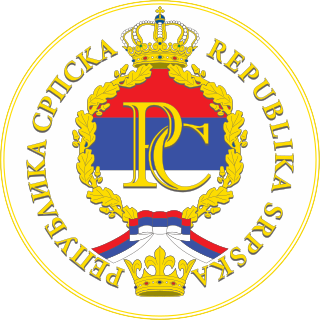
The Seal of Republika Srpska with the description: the flag of Republika Srpska and the Cyrillic letters "РС" ("RS"), the red-blue-white tricolor are in the center of the seal, twisted with the golden Oak leaves, a traditional pre-Christian symbol sacred to most Slavs. On the edge of the seal there is an inscription Republika Srpska. The open crown of Kotromanić is shown in the bottom of the seal and the seal itself is topped with a heraldic royal crown.
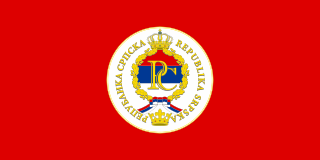
The president of Republika Srpska is the highest executive authority in Republika Srpska, an entity in Bosnia and Herzegovina. It is one of the executive authorities, along with the Government of Republika Srpska. The president of Republika Srpska is directly elected for a term of four years, along with two vice presidents from different constituent nations. None of them can be from a same constituent nation at the same time. The president's residence is in Banja Luka.
Nikola Poplašen is a former Bosnian Serb politician. He was the president of Republika Srpska from late 1998 to 1999. He was removed by the High Representative of Bosnia and Herzegovina, Carlos Westendorp, on 5 March 1999. The removal was enforced on 2 September 1999.

Željka Cvijanović is a Bosnian Serb politician serving as the 8th and current Serb member of the Presidency of Bosnia and Herzegovina since 2022. She previously served as the 9th president of Republika Srpska from 2018 to 2022.
Several referendums have been held in Republika Srpska during its existence, whilst others have been proposed but not happened.
Zlatko M. Knežević is a judge of the Constitutional Court of Bosnia and Herzegovina.

Central Election Commission of Bosnia and Herzegovina is the administrative body responsible for regulating and supervising the election process in Bosnia and Herzegovina. The CEC also oversees the work of local and regional election commissions, which regulate the electoral process in lower administrative units.
References
- ↑ "Opinion on the implications of Partial Decision III of the Constitutional Court of Bosnia and Herzegovina in Case U 5/98 on the Issue of the "Constituent Peoples"". Venice Commission. 12 March 2001. p. 5. Retrieved 2013-06-05.
- ↑ sarajevotimes
